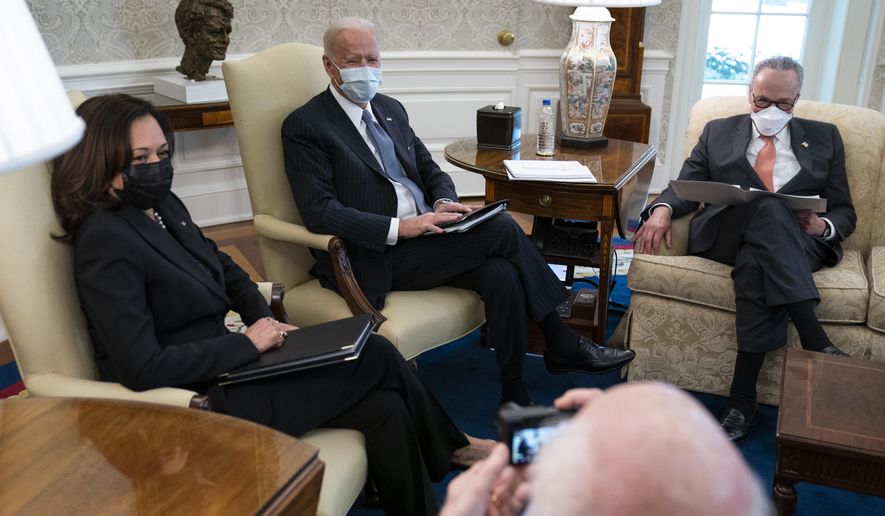President Biden said Wednesday that he thinks at least a few congressional Republicans will support the next round of coronavirus relief legislation as negotiations continue on Capitol Hill.
“I think we’ll get some Republicans,” Mr. Biden said at a meeting at the White House with a group of Senate Democrats.
Attendees included Senate Majority Leader Charles E. Schumer of New York and soon-to-be Senate Budget Committee Chairman Bernard Sanders of Vermont.
Lawmakers are trying to find a path forward on moving Mr. Biden’s $1.9 trillion coronavirus relief package through Congress.
Mr. Biden also joined House Democrats on their conference call earlier in the day to talk about his plan.
Rep. Hakeem Jeffries, who chairs the House Democratic Caucus, said Mr. Biden was clear that direct payments of up to $1,400 per person needed to be part of the package.
“He talked about the importance of bipartisanship, but framed it — in my view — in the broadest possible context,” the New York Democrat said.
Congressional Democrats are pressing forward this week on passing a budget resolution to unlock a fast-track tool that would allow them to pass a package without needing to win over any Republicans.
“He will do his best, but unity doesn’t mean unanimity and unity doesn’t mean letting the minority party block progress in the Senate,” Sen. Chris Coons of Delaware said earlier in the day after emerging from a different meeting at the White House.
The Senate is split 50-50 between the two parties, but Democrats have effective control via Vice President Kamala Harris’s tie-breaking vote.
Sen. John Thune of South Dakota, the No. 2-ranking Senate Republican, said on the Senate floor Wednesday that Democrats’ teeing things up to move a package without Republican support was “troubling.”
Mr. Biden’s $1.9 trillion package includes approximately $1 trillion in direct aid, more than $400 billion for coronavirus-related efforts like vaccine distribution, and $350 billion for states and localities.
Mr. Coons said the package has to include at least some funding for states and localities.
“Speaking for myself, if there is zero for state and local aid I think that’s a non-starter,” the senator said.
Mr. Biden met with Republican senators at the White House earlier this week.
A group of Senate Republicans is pushing a package totaling approximately $600 billion that does not include the state and local funding.
Republicans have questioned the high price tag of Mr. Biden’s plan, pointing out that Congress only just authorized another $900 billion in coronavirus relief in December that’s still getting out the door.
They also say cash-strapped cities and states shouldn’t automatically get a taxpayer-funded bailout to fix budget problems that might have predated the public health crisis.
The full $1.9 trillion package would boost the economy by 0.6 percent this year even as the additional public debt would be a drag on the economy over time, according to an analysis from the University of Pennsylvania that was released on Wednesday.
The Penn Wharton Budget Model projected that 73% of the direct payments of up to $1,400 per person in the Biden plan would go directly into household savings and produce “small stimulative effects.”
White House press secretary Jen Psaki said the Penn Wharton report was “way out of step” with other analyses and assumes the U.S. economy is near capacity.
“This starting place means their model is way off,” she said.
Mr. Thune said the GOP stands ready to work with Democrats on a targeted bill.
“Sending checks to those who don’t need them and won’t spend them is not a good use of taxpayer money,” he said.
Mr. Biden has indicated he’s open to negotiating income limits for the direct checks.
The direct payments in the rounds of coronavirus relief that Congress authorized last year started phasing out for individuals making more than $75,000 per year and couples making more than $150,000 per year.
The Senate Republican proposal would provide up to $1,000 per person in direct payments. The payments would start to phase out for individuals who earn more than $40,000 per year and couples making more than $80,000 per year.
• David Sherfinski can be reached at dsherfinski@washingtontimes.com.




Please read our comment policy before commenting.